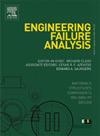A hybrid failure analysis model design for marine engineering systems: A case study on alternative propulsion system
IF 4.4
2区 工程技术
Q1 ENGINEERING, MECHANICAL
引用次数: 0
Abstract
Marine engineering systems have a fundamental role in ensuring the efficiency, safety, and sustainability of maritime transportation. The performance and reliability of these systems, particularly propulsion systems, are of paramount importance. This paper introduces a pioneering hybrid failure analysis model that integrate the Variable Weighted Synthesis Analytic Hierarchy Process (VWS-AHP) with the conventional Failure Mode and Effect Analysis (FMEA) methodology. The primary objective is to enhance the comprehension of failure modes within marine engineering systems, particularly focusing on alternative propulsion systems. While conventional FMEA is a widely employed methodology for analysis of failure modes, its capacity and effectiveness can be further augmented by integrating complementary techniques. The proposed hybrid model combines the robustness of FMEA in identifying failure modes with the VWS-AHP method’s ability to handle complex decision-making scenarios involving multiple criteria and varying levels of importance. This integration affords a comprehensive framework to assess failure risks, prioritize critical failure pathways, and evaluate the potential impacts of failures in marine engineering systems. To demonstrate the applicability of the proposed model, we conduct a case study on an alternative propulsion system. The outcomes of the case study showcase the efficacy of the hybrid model in enhancing FMEA.
海洋工程系统的混合故障分析模型设计:替代推进系统案例研究
海洋工程系统在确保海上运输的效率、安全性和可持续性方面发挥着重要作用。这些系统,尤其是推进系统的性能和可靠性至关重要。本文介绍了一种开创性的混合故障分析模型,该模型将可变加权综合层次分析法(VWS-AHP)与传统的故障模式与影响分析(FMEA)方法相结合。其主要目的是加强对海洋工程系统故障模式的理解,尤其是对替代推进系统的理解。虽然传统的 FMEA 是一种广泛使用的故障模式分析方法,但通过整合补充技术,可以进一步增强其能力和有效性。所提出的混合模型将 FMEA 在识别故障模式方面的稳健性与 VWS-AHP 方法处理涉及多个标准和不同重要程度的复杂决策情景的能力相结合。这种整合为评估失效风险、确定关键失效途径的优先级以及评估海洋工程系统失效的潜在影响提供了一个全面的框架。为了证明所提模型的适用性,我们对一个替代推进系统进行了案例研究。案例研究的结果展示了混合模型在增强 FMEA 方面的功效。
本文章由计算机程序翻译,如有差异,请以英文原文为准。
求助全文
约1分钟内获得全文
求助全文
来源期刊

Engineering Failure Analysis
工程技术-材料科学:表征与测试
CiteScore
7.70
自引率
20.00%
发文量
956
审稿时长
47 days
期刊介绍:
Engineering Failure Analysis publishes research papers describing the analysis of engineering failures and related studies.
Papers relating to the structure, properties and behaviour of engineering materials are encouraged, particularly those which also involve the detailed application of materials parameters to problems in engineering structures, components and design. In addition to the area of materials engineering, the interacting fields of mechanical, manufacturing, aeronautical, civil, chemical, corrosion and design engineering are considered relevant. Activity should be directed at analysing engineering failures and carrying out research to help reduce the incidences of failures and to extend the operating horizons of engineering materials.
Emphasis is placed on the mechanical properties of materials and their behaviour when influenced by structure, process and environment. Metallic, polymeric, ceramic and natural materials are all included and the application of these materials to real engineering situations should be emphasised. The use of a case-study based approach is also encouraged.
Engineering Failure Analysis provides essential reference material and critical feedback into the design process thereby contributing to the prevention of engineering failures in the future. All submissions will be subject to peer review from leading experts in the field.
 求助内容:
求助内容: 应助结果提醒方式:
应助结果提醒方式:


